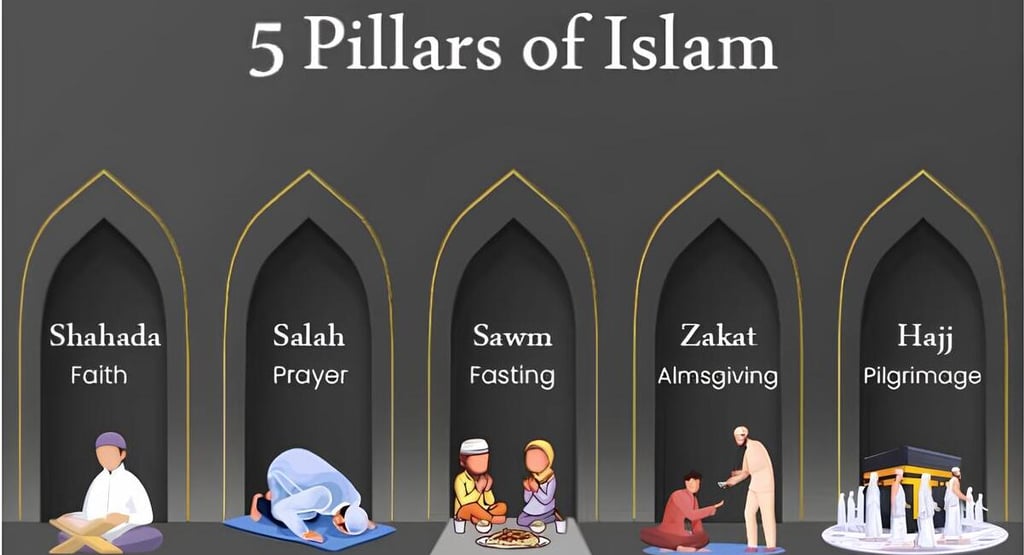أَلَا بِذِكْرِ اللَّهِ تَطْمَئِنُّ الْقُلُوبُ
The Five Pillars of Islam : Fundamentals of Faith
The Five Pillars of Islam are the core principles and practices that every Muslim is obligated to observe. They provide a framework for a life devoted to worship and ethical conduct. By adhering to these pillars, Muslims maintain a strong connection with their Creator and the community. Let’s explore each pillar and its significance.
Noor Academy Pakistan
11/26/20242 min read
The Five Pillars of Islam: Foundations of Faith
The Five Pillars of Islam are the core principles and practices that every Muslim is obligated to observe. They provide a framework for a life devoted to worship and ethical conduct. By adhering to these pillars, Muslims maintain a strong connection with their Creator and the community. Let’s explore each pillar and its significance.
1. Shahada (Faith)
The Shahada, or declaration of faith, is the foundation of Islamic belief. It states:
“There is no god but Allah, and Muhammad is the Messenger of Allah.”
This testimony signifies monotheism and the acceptance of Prophet Muhammad (peace be upon him) as the final messenger. The Shahada is not merely a verbal affirmation but a commitment to live according to Allah’s guidance and emulate the Prophet’s teachings. It is the first step to becoming a Muslim and serves as the cornerstone of Islamic identity.
2. Salah (Prayer)
Salah, the obligatory prayer, is performed five times a day: at dawn (Fajr), midday (Dhuhr), afternoon (Asr), sunset (Maghrib), and night (Isha). It is a direct link between the worshiper and Allah.
The Quran emphasizes Salah:
“Indeed, prayer has been decreed upon the believers a decree of specified times.” (Quran 4:103)
Through Salah, Muslims demonstrate their obedience and gratitude to Allah. The structured prayers involve recitations from the Quran, physical movements, and supplication, creating a balance of body, mind, and spirit.
3. Sawm (Fasting)
Sawm, observed during the holy month of Ramadan, involves abstaining from food, drink, and other physical needs from dawn to sunset. This practice instills discipline, self-control, and empathy for those who are less fortunate.
The Quran describes fasting as a means of attaining righteousness:
“O you who have believed, decreed upon you is fasting as it was decreed upon those before you that you may become righteous.” (Quran 2:183)
Ramadan is also a time for spiritual reflection, increased worship, and community bonding.
3. Zakat (Charity)
Zakat, meaning purification, is an obligatory form of charity. It requires Muslims to give a portion (usually 2.5%) of their surplus wealth to those in need. The Quran highlights the importance of Zakat:
“Establish prayer and give Zakat, and whatever good you put forward for yourselves—you will find it with Allah.” (Quran 2:110)
Zakat promotes social equality by redistributing wealth and alleviating poverty. It fosters compassion and solidarity, reminding Muslims of their responsibility toward the less fortunate.
5. Hajj (Pilgrimage)
Hajj, the pilgrimage to the holy city of Mecca, is a once-in-a-lifetime obligation for those who are physically and financially able. It occurs during the Islamic month of Dhul-Hijjah and commemorates the trials of Prophet Ibrahim (Abraham, peace be upon him) and his family.
During Hajj, Muslims perform rituals such as circling the Kaaba, standing at Arafat, and stoning the pillars at Mina. These acts symbolize devotion, unity, and submission to Allah.
The Quran enjoins this act of worship:
“And complete the Hajj and Umrah for Allah.” (Quran 2:196)
Conclusion
The Five Pillars of Islam are more than rituals; they are acts of devotion that shape a Muslim's life, fostering a sense of purpose, discipline, and community. They remind believers of their obligations to Allah and humanity, ensuring a balanced and meaningful life.
By faithfully observing these pillars, Muslims maintain a spiritual connection with their Creator and contribute positively to society, embodying the essence of Islam as a religion of peace and submission.
Online Education with Ease
Empowering learners through online Islamic studies and Quran.
Contact us.
Whatsapp /Call : +92-346-1870400
Noor Academy Pakistan © 2025. All rights reserved.
Email : nooracademy.pk@gmail.com




